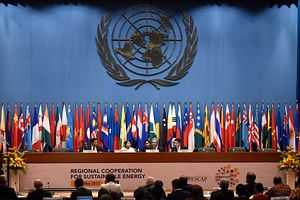Trans-Pacific View author Mercy Kuo regularly engages subject-matter experts, policy practitioners, and strategic thinkers across the globe for their diverse insights into U.S. Asia policy. This conversation with Jeffrey Feltman, John C. Whitehead Visiting Fellow in International Diplomacy in the Foreign Policy program at the Brookings Institution and former undersecretary for political affairs at the United Nations in New York, is the 258th in “The Trans-Pacific View Insight Series.”
Describe key characteristics of how China exercises influence at the United Nations.
Let us acknowledge that it is perfectly reasonable for China to expect its voice to carry more weight inside the United Nations today than it did in previous decades. In terms of assessed contributions ̶ mandatory dues ̶ China is now the second largest contributor to the U.N.’s regular and peacekeeping budgets, even though its voluntary contributions to the U.N.’s humanitarian and development work lags shamefully behind. China’s growing economic and political weight means growing influence. Thus, in some ways, China is merely asserting its power in ways the United States and others have been doing in the U.N. for years.
But what should concern us is that China wants to change the U.N. China seems determined to swap out the universal values that comprise the U.N.’s “software” for an operating system in line with China’s governing system. China methodically tries to change the normative values that define the U.N. For example, when we speak of “rule of law” in multilateral fora, we are talking of governance – how governments treat their citizens. China will strive to insert “between states” after any reference to “rule of law.” This changes the meaning profoundly, away from being about how governments treat their citizens to one about how governments behave with each other. China can rely for support on many autocratic states who, like China, reject scrutiny or criticism of human rights practices.
What is the impact of U.S.-China rivalry on U.N. internal political dynamics?
While we are not (yet) in a “new Cold War,” there are similarities. As in the Cold War, the Security Council is paralyzed on key peace and security matters, with China and Russia working in solidarity to stymie efforts to bring peace and justice to Syria and block U.N. action in Ukraine. But also like the Cold War, as when the Soviet Union and the United States worked together to strengthen the IAEA and the non-proliferation regime, there have been areas of cooperation despite the great power competition: think of united Security Council action regarding the DPRK’s pursuit of nuclear weaponry. One area where we might potentially see more U.S.-Chinese cooperation is on budget scrutiny: With the rise in Chinese mandatory assessments to the U.N., China now watches U.N. spending in ways similar to longstanding U.S. concerns. Even on peace and security, there may be the potential for U.S.-Chinese cooperation in specific areas. Whereas Russia exploits instability in the Middle East and North Africa, as we see in Syria and Libya, China tends to favor stability in Africa and the Middle East, to gain access to markets and resources. In short, the United States and China will probably compete in some areas and cooperate in others, as Moscow and Washington did during the Cold War.
Explain how U.N. members are responding to China’s growing global influence and “wolf warrior” diplomacy.
One sees growing concern in multilateral bodies, including the U.N., over China’s more assertive role. This unease should facilitate the assembly of coalitions to defend and promote what matters to us in the international system. Even during the vandalism of the Trump administration’s foreign policy, the U.S. joined with others to block China’s candidate to head the World Intellectual Property Organization, WIPO. The U.S and others were able to draw upon a shared fear of Chinese intellectual property practices that many countries saw as proprietary theft. I would recommend that the United States and others cultivate and expand issues-based coalitions to push back against Chinese efforts to change and distort the international order.
How might the Biden administration exercise U.S. leadership at the U.N. in the post-Trump era?
If the Biden administration is both present and humble in international bodies, it can lead the coalitions I just described to compete successfully with China. By withdrawing from organizations and agreements, the Trump administration created vacuums in the international system that China was all too happy to fill. We have what I call a home turf advantage in the U.N., as the United States more than any other country helped establish the rules of the game. If we stomp off the playing field because the Chinese team has gotten so much better at playing the game, we facilitate the Chinese victory and allow them more easily to change the rules of the game. At the same time, a bit of humility is warranted: This is no longer the unipolar world of the 1990s, and the United States needs to acknowledge that other states have interests and goals that do not always align with ours.
Identify the top three challenges and opportunities for advancing the new U.S. administration’s agenda at the U.N. in the face of U.S.-China tensions.
The top three challenges: Maintaining the human rights pillar of the U.N. in the face of erosion of democratic norms in too many countries, including in Asia. Peacefully addressing tensions in the South China Sea. Encouraging China to channel more development and humanitarian assistance ̶ voluntary contributions ̶ through U.N. bodies.
The top three opportunities: Maintaining a common approach toward the DPRK. Rebuilding Sino-American solidarity to address the climate crisis. Working together with China on ways to address inequality within and between states.

































